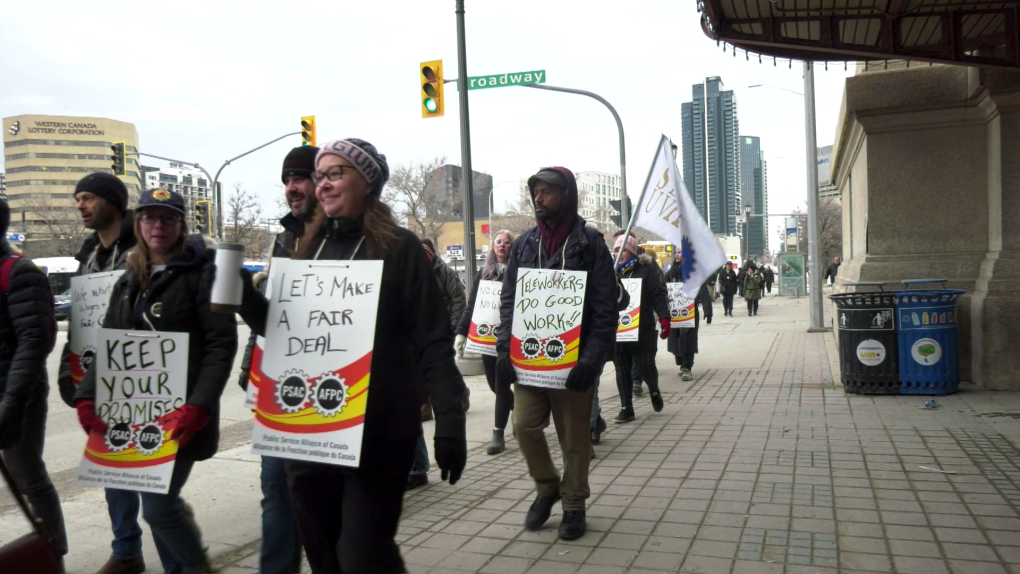Federal workers in Manitoba hit the picket lines as strike begins
Thousands of federal workers in Manitoba were off the job on Wednesday as the public service strike got underway.
The Public Service Alliance of Canada (PSAC), the largest federal public-service union in the country, did not reach a tentative agreement with the federal government by Tuesday evening, with the strike beginning this morning at 12:01 a.m. ET.
The bargaining groups include about 155,000 federal public servants, including Canada Revenue Agency workers and those who process passport applications, employment insurance and immigration documents.
According to PSAC’s website, it has more than 8,000 members in Manitoba.
In Winnipeg, pickets were scheduled for Tuesday morning at federal buildings, including Service Canada and Union Station.
George Meldrum, a PSAC strike captain, said the mood at the Union Station picket line was “positive.”
“Everybody’s not exactly happy to be here, but everybody has smiles. They’re walking peacefully, holding up the signs,” he said.
“We’ve got a lot of people honking, so the mood has been really, really positive.”
 Winnipeg employees from the largest federal public-service union in the country picket outside Union Station on April 19, 2023. (Source: Joseph Bernacki/CTV News Winnipeg)
Winnipeg employees from the largest federal public-service union in the country picket outside Union Station on April 19, 2023. (Source: Joseph Bernacki/CTV News Winnipeg)
Meldrum said he wants people to know that federal workers don’t want to be in this position, adding that the federal government could have signed a deal two years ago.
“We’ve been waiting two years and counting for an agreement,” he said.
Initial negotiations began in June 2021, with the union looking for a new contract. The union declared an impasse in May 2022 and both parties filed labour complaints. Mediated contract negotiations began earlier this month and pushed into last weekend in what the union described as the government's last chance to reach a deal.
The federal workers are seeking fair remote-work arrangements and wage increases, with the union pushing for annual raises of 4.5 per cent over the next three years.
David Camfield, an associate professor of labour studies and sociology, at the University of Manitoba, said the demand for wage increases comes at a time when costs have skyrocketed.
“Between 2019 and 2022, we saw prices go up by about 11 per cent, but very few people’s wages have grown to meet that,” he said.
As for the issue of remote work, Camfield said the federal government imposed the unilateral return to the office of at least two days a week, but the union has nothing about this in its collective agreement.
“They’re trying to negotiate some basic provisions that would ensure some kind of fairness, some kind of universal approach to how this will be dealt with in the future,” he said.
Camfield added that the two sides are still at the bargaining table, and the question remains as to whether the strike will put enough pressure on the government to move their position closer to what the union feels is adequate for a tentative agreement.
- With files from CTV’s Joseph Bernacki and Nicole Dube.
A late Tuesday news release from the Treasury Board of Canada Secretariat says the government and the Public Service Alliance of Canada are still at odds when it comes to key contract issues for both sides.
- With files from CTV’s Joseph Bernacki and The Canadian Press
CTVNews.ca Top Stories

BREAKING Donald Trump picks former U.S. congressman Pete Hoekstra as ambassador to Canada
U.S. president-elect Donald Trump has nominated former diplomat and U.S. congressman Pete Hoekstra to be the American ambassador to Canada.
Genetic evidence backs up COVID-19 origin theory that pandemic started in seafood market
A group of researchers say they have more evidence to suggest the COVID-19 pandemic started in a Chinese seafood market where it spread from infected animals to humans. The evidence is laid out in a recent study published in Cell, a scientific journal, nearly five years after the first known COVID-19 outbreak.
This is how much money you need to make to buy a house in Canada's largest cities
The average salary needed to buy a home keeps inching down in cities across Canada, according to the latest data.
'My two daughters were sleeping': London Ont. family in shock after their home riddled with gunfire
A London father and son they’re shocked and confused after their home was riddled with bullets while young children were sleeping inside.
Smuggler arrested with 300 tarantulas strapped to his body
Police in Peru have arrested a man caught trying to leave the country with 320 tarantulas, 110 centipedes and nine bullet ants strapped to his body.
Boissonnault out of cabinet to 'focus on clearing the allegations,' Trudeau announces
Prime Minister Justin Trudeau has announced embattled minister Randy Boissonnault is out of cabinet.
Baby dies after being reported missing in midtown Toronto: police
A four-month-old baby is dead after what Toronto police are calling a “suspicious incident” at a Toronto Community Housing building in the city’s midtown area on Wednesday afternoon.
Sask. woman who refused to provide breath sample did not break the law, court finds
A Saskatchewan woman who refused to provide a breath sample after being stopped by police in Regina did not break the law – as the officer's request was deemed not lawful given the circumstances.
Parole board reverses decision and will allow families of Paul Bernardo's victims to attend upcoming parole hearing in person
The families of the victims of Paul Bernardo will be allowed to attend the serial killer’s upcoming parole hearing in person, the Parole Board of Canada (PBC) says.


































